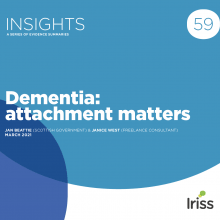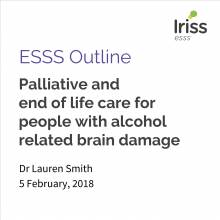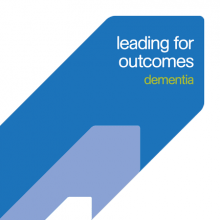This Insight looks at reminiscence therapy and life story work for those with dementia.
Key points
- Reminiscence therapy and life story work are valuable psychotherapeutic approaches
- Reminiscence therapy and life story work can improve the mood, cognitive ability and well-being of those with mild to moderate dementia
- Research suggests that the effects of biographical interventions are weaker for people with severe dementia
- There is evidence to support the view that life story work can improve the relationship, whether family or professional, between the person with dementia and their carer(s)
- Reminiscence therapy and in particular life story work provide a context for the provision of person-centred care, whether in the home, nursing home or hospital context
- Life story work can be especially valuable when the person with dementia is transferred from a home to an institutional setting, or between institutions
Current situation and policy context
Dementia is a priority for the Scottish Government and this is reflected in the publication of Scotland's National Dementia Strategy (June 2010). In Scotland there are an estimated 71,000 people with dementia. This number is expected to double over the next 25 years. Some 64% of dementia sufferers live in their own homes, with the others living in care homes. Approximately 70% of care home residents may have dementia. There is some evidence to support the view that a healthy lifestyle comprised of good nutrition, adequate exercise and social relations may reduce the risk of developing dementia in later life. However, there is no single prophylactic (drug or lifestyle choice) that prevents the onset of the condition.
Part of the government's focus on dementia involves ensuring that people with the disease get access to the care and support they need, and this includes reducing the use of psychoactive medication where possible. Research highlights the various alternatives to drugs that are available to those with dementia. The therapies most commonly referenced are reminiscence therapy, including life story work, cognitive orientation and cognitive stimulation therapy. Reminiscence therapy has attracted considerable attention in recent years and there is a growing body of literature that supports using this technique with people with mild to moderate dementia.
Studies undertaken with those with severe dementia have yielded mixed, but occasionally encouraging, results (Hoerster et al, 2001; McPherson et al, 2001).
Reminiscence therapy is a biographical intervention that involves either group reminiscence work, where the past is discussed generally, or the use of stimuli such as music or pictures. Although closely related to reminiscence therapy, life story work tends to focus on putting together a life story album for an individual (Moos and Bjorn, 2006). Evidence suggests that reminiscence therapy can lead to overall improvements in depression and loneliness and promote psychological well-being (Chiang et al, 2010). Research also supports the view that reminiscence therapy, including life story work, can improve relationships between people with dementia and their carers and thereby 'benefits both' (Woods et al, 2009:1; Clarke et al, 2003; McKeown et al, 2006). Other reported benefits include enhancing the opportunity to provide personal and individualised care and assisting the individual move between different care environments such as home to care home, or between care homes (Murphy, 2000).
In Scotland, policies dealing with dementia and the provision of social and other types of support have focused on care and respect (Charter of Rights for People with Dementia and their Carers in Scotland, 2009), and at improving staff skills and knowledge. Ensuring that care staff have information about the person with dementia, including their likes and dislikes and not just their diagnosis, has been seen as critical to providing effective support (Scotland's National Dementia Strategy, 2010). The 2009 report from the Care Commission and the Mental Welfare Commission, Remember, I'm Still Me, cautioned that the use of psychoactive drugs should be the course of last, rather than first resort, when responding to challenging behaviour.
Working with Older People in Scotland (NES, 2007) stipulates that nurses should demonstrate sensitivity to the older person, by understanding their cultural, spiritual and social background and should seek to engage with them through their values and aspirations. Additionally, nursing practitioners should, 'draw on a range of different psychological and psychosocial approaches appropriate to the older person' (p19). Of key importance and heavily emphasised in this document is the ability of the nursing practitioner, at all levels, to 'promote collaboration with the older person, recognising their individual life story and values' and that this should 'inform all care decisions' (p21). Within this context reminiscence therapy, and more specifically life story work, have been recognised as offering ways for those with dementia to articulate their needs, and for allowing care and nursing staff to deliver person- centred care.
Barriers to using reminiscence therapy and life story work
Clarke and colleagues (2003) reveal the expressed concern of care staff that psychological types of therapy involving discussion and personal interaction are often not viewed as 'real work'. Another view explored by Kerr et al (2005) suggests that depression in older people is viewed as somehow natural, even when evidence indicates that a range of interventions, many of them psychotherapeutic, can be effective. If reminiscence therapy and life story work are to be used as effective treatments for those with mild to medium cognitive impairment, it is important that the potential value of these psychotherapeutic approaches is understood by care staff and endorsed by those in managerial positions.
Research evidence
The research evidence on reminiscence therapy has examined its impact on older people with dementia and those without the disease. Research by Chiang and colleagues (2010) among older people without dementia in institutions in Taiwan, found that there was a positive effect amongst research subjects involved in reminiscence therapy that was not found in the control group. The study found that those participants involved in reminiscence therapy were more sociable, less depressed and showed stronger signs of well-being than control group members. The relatively small sample size, its composition (all male) and short-term nature of the study (three months) mean that the results, although favourable, cannot be generalised to the whole population.
Other studies conducted amongst individuals with dementia have delivered very encouraging findings on the effect of reminiscence therapy. Although the Cochrane review (Woods et al, 2009) found that evidence in support of reminiscence therapy for those with dementia was inconclusive, they indicated that at a meta-analytical level, the combined results of the studies showed that reminiscence therapy has the following positive effects:
- Improvements in cognition and mood of those with dementia
- Reductions in the strain experienced by care-givers and relatives
- Improvements in functional ability of dementia participants
- Reductions in the symptoms of depression
Of considerable significance is the finding that, 'no harmful effects were identified on the outcomes measures reported' (p2). A study by McKee and colleagues (2003) identified several positive effects of reminiscence therapy and emphasised the enjoyment of those involved. The Alzheimer's Society is strongly in favour of the reminiscence therapy approach and outline it in their publication Memories are Made of This (Heathcote, 2009). The main benefits to the individual are cited as follows:
- Empowerment
- Raised self-esteem
- Improved communication
- Stimulation and fun
- Enhanced mood.
While current research findings are encouraging and supportive of the use of reminiscence therapy, there is still a need for thorough, rigorous research on the therapy to further substantiate the effectiveness of the approach.
Aims and models of delivery
Reminiscence therapy and life story work can be utilised in a number of ways; indeed, the variation in the methods of possible delivery further confound many of the research results considered in the Cochrane review and in this document. The short synopsis of approaches outlined below is intended to be indicative, rather than exhaustive, of the various approaches to delivering reminiscence therapy and life story work.
- The aims of reminiscence therapy and life story work are varied
- Uncover or preserve the identify of older people (Murphy, 2000; Clarke et al, 2003)
- Improve the quality of life through the impact of 'being listened to' (McKee et al, 2003)
- Allow staff to see beyond the diagnosis (Murphy 2000; Clarke et al, 2003)
- Facilitate communication between the person with dementia and their families (Batson et al, 2002)
- Provide enjoyment for the recipient of therapy (Murphy, 2000)
Reminiscence therapy and life story work therapy can range from one-to-one delivery to group work. It may involve the development of a life story album for a person (care home staff and relatives can assist with its formation), or it may involve group reminiscence work where memory prompts such as photographs are shown. The life story approach allows the individual to map where they have been, their jobs, the food they enjoy and other information specific to their life. It provides a context and focus for engagement with care home staff and family members. The Alzheimer's Society publication Memories are Made of This presents a valuable starting point for those wishing to understand and apply the technique as part of a care strategy.
Implications for practice
The Dementia Strategy for Scotland highlights the case of an older man with dementia entering a care home. He was found to be disruptive, restless and angry, and was prescribed neuroleptics. However, he had previously been employed as a postman and had enjoyed a very active lifestyle yet had been denied access to outside space and exercise whilst resident in a care home. Adequate information about an individual with dementia is considered a fundamental requirement to developing and delivering person-centred care. Understanding the individual within the context of their 'life story' assists care staff develop appropriate care strategies and delivery methods. According to the foregoing research, life story work can also enhance the relationship between the dementia sufferer and their carer and/or family. It is the Alzheimer's Society's view that life story work, by pinpointing the likes, dislikes, spiritual and contextual aspects of a person's life, greatly enhances the ability for care staff to understand and respond to the individual with dementia, and to create a framework for delivering tailored personal care. Reminiscence therapy and particularly life story work are valuable tools for care staff in developing engagement with those with dementia. The Alzheimer's Society summarise the benefits of the approach for care staff as follows:
- Supporting people with dementia
- Improving understanding and engagement
- Appreciating the person first and dementia second
- Improving communication skills in terms of both listening and responding
- Facilitating work with people and their families
A valuable repository of information for those wishing to learn about or use life story work can be found at http://www.lifestorynetwork.org.uk.
Biographical approaches provide older people with opportunities, if they so desire, to talk about their life experiences family, friends, work history, hobbies often using photographs and personal belongings as triggers to discussion. Exploring older people s past and present lives with them, particularly the circumstances which have shaped their experiences, potentially provides greater insights into their needs and aspirations and may help to challenge ageist stereotypes about later life. Listening to a person s life story is a powerful way of showing that they are valued as an individual and may also have a cathartic value.
-Clarke, Hanson and Ross (2003)
References
- Batson P, Thorne K and Peak J (2002) Life story work sees the person beyond the dementia, Journal of Dementia Care 10, 3,15-17
- Chiang K J, Chu H, Chang H J et al (2010) The effects of reminiscence therapy on psychological well-being, depression, and loneliness among the institutionalised aged, International Journal of Geriatric Psychiatry, 25, 380-388
- Clarke A, Hanson E J and Ross H (2003) Seeing the person behind the patient: enhancing the care of older people using a biographical approach, Journal of Clinical Nursing, 12, 697-706
- Heathcote J (2009) Memories are made of this: Reminiscence activities for person-centred care, London: Alzheimer's Society
- Hoerster L, Hickey E and Bourgeois M (2001) Effects of memory aids on conversations between nursing home residents with dementia and nursing assistants, Neuropsychological Rehabilitation, 11, 399-427
- Kerr B, MacDonald C, Gordon J and Stalker K (2005) Effective Social Work with Older People, Edinburgh: Scottish Executive Social Research
- McKee K, Wilson F, Elford H et al (2003) Reminiscence: is living in the past good for wellbeing? Nursing and Residential Care, 5, 489-491
- McKeown J, Clarke A and Repper J (2006) Life story work in health and social care: systematic literature review, Journal of Advanced Nursing, 55, 237-247
- McPherson A, Furniss F, Sdogati C et al (2001) Effects of individualised memory aids on the conversation of persons with severe dementia: a pilot study, Aging and Mental Health 5, 289-294
- Moos I and Bjorn A (2006) Use of life story in the institutional care of people with dementia: a review of intervention studies, Ageing and Society, 26, 431- 454
- Murphy C (2000) Crackin' lives: an evaluation of a life story book project to assist patients from a long stay psychiatric hospital in their move to community care situations, Stirling: Dementia Services Development Centre
- NHS Education for Scotland (2007) Working with Older People in Scotland - A Framework for Mental Health Nurses
- Woods B, Spector A, Jones C et al (2009) Reminiscence therapy for dementia (Review), www.thecochranelibrary.com
Thanks
Iriss would like to thank the Dementia Services Development Centre at the University of Stirling for their help sourcing articles for this Insight



